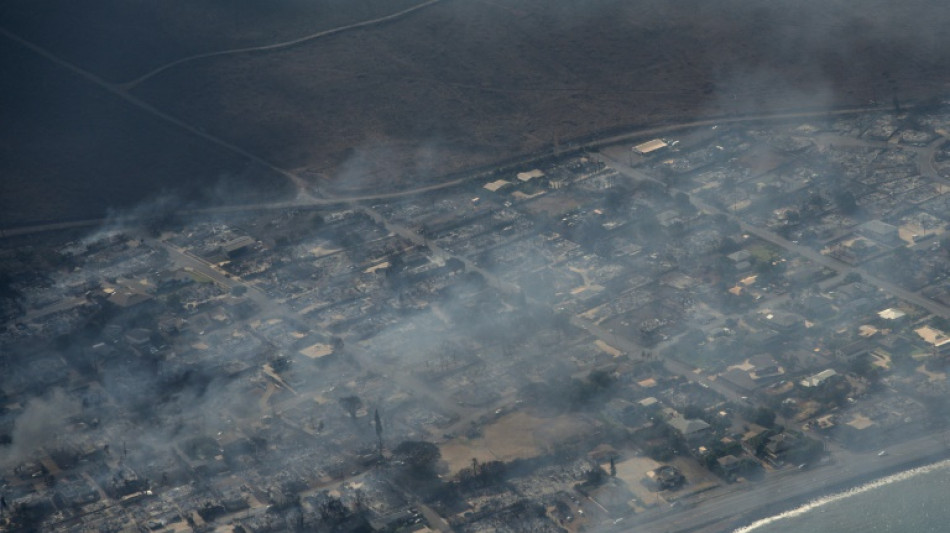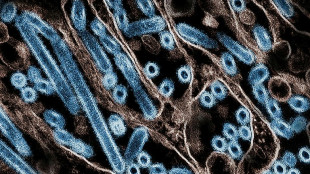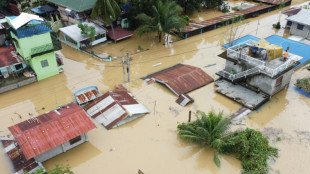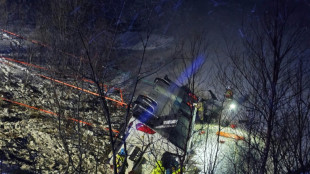
-
 Fresh strike hits Yemen's rebel-held capital
Fresh strike hits Yemen's rebel-held capital
-
Netflix with Beyonce make splash despite NFL ratings fall

-
 Bird flu mutated inside US patient, raising concern
Bird flu mutated inside US patient, raising concern
-
Slovakia says ready to host Russia-Ukraine peace talks

-
 Maresca challenges Chelsea to react to Fulham blow
Maresca challenges Chelsea to react to Fulham blow
-
Tech slump slays Santa rally, weak yen lifts Japan stocks higher

-
 Test records for Zimbabwe and Williams as Afghanistan toil
Test records for Zimbabwe and Williams as Afghanistan toil
-
LawConnect wins punishing Sydney-Hobart yacht race

-
 Barca's Yamal vows to 'come back better' after ankle injury
Barca's Yamal vows to 'come back better' after ankle injury
-
Olmo closer to Barcelona exit after registration request rejected

-
 Watching the sun rise over a new Damascus
Watching the sun rise over a new Damascus
-
Malaysia man flogged in mosque for crime of gender mixing

-
 Montenegro to extradite crypto entrepreneur Do Kwon to US
Montenegro to extradite crypto entrepreneur Do Kwon to US
-
Brazil views labor violations at BYD site as human 'trafficking'

-
 No extra pressure for Slot as Premier League leaders Liverpool pull clear
No extra pressure for Slot as Premier League leaders Liverpool pull clear
-
Tourists return to post-Olympic Paris for holiday magic

-
 'Football harder than Prime Minister' comment was joke, says Postecoglou
'Football harder than Prime Minister' comment was joke, says Postecoglou
-
Driver who killed 35 in China car ramming sentenced to death

-
 Bosch gives South Africa 90-run lead against Pakistan
Bosch gives South Africa 90-run lead against Pakistan
-
French skier Sarrazin 'conscious' after training crash

-
 NATO to boost military presence in Baltic after cables 'sabotage'
NATO to boost military presence in Baltic after cables 'sabotage'
-
Howe hopes Newcastle have 'moved on' in last two seasons

-
 German president dissolves parliament, sets Feb 23 election date
German president dissolves parliament, sets Feb 23 election date
-
Slot says 'too early' for Liverpool title talk

-
 Mayotte faces environment, biodiversity crisis after cyclone
Mayotte faces environment, biodiversity crisis after cyclone
-
Amorm says 'survival' aim for Man Utd after Wolves loss

-
 Desertions spark panic, and pardons, in Ukraine's army
Desertions spark panic, and pardons, in Ukraine's army
-
China sanctions US firms over Taiwan military support

-
 World number six Rybakina makes winning start at United Cup
World number six Rybakina makes winning start at United Cup
-
Israeli strikes hit Yemen airport as WHO chief prepares to leave

-
 Swiatek not expecting WADA appeal over doping scandal
Swiatek not expecting WADA appeal over doping scandal
-
'Dangerous new era': climate change spurs disaster in 2024

-
 Fritz motivated for Slam success after low-key off-season
Fritz motivated for Slam success after low-key off-season
-
Move over Mercedes: Chinese cars grab Mexican market share

-
 Zverev aiming to challenge Sinner for top ranking
Zverev aiming to challenge Sinner for top ranking
-
N. Korean soldier captured in Russia-Ukraine war: Seoul

-
 Inspired Tsitsipas looking to 'refresh, regroup' in Australia
Inspired Tsitsipas looking to 'refresh, regroup' in Australia
-
Seahawks edge Bears to boost NFL playoff hopes

-
 Thunder NBA win streak at nine as Shai ties career high with 45
Thunder NBA win streak at nine as Shai ties career high with 45
-
India announces state funeral for ex-PM Manmohan Singh

-
 Japan govt approves record budget for ageing population, defence
Japan govt approves record budget for ageing population, defence
-
Japanese shares gain on weaker yen after Christmas break

-
 South Korea's acting president faces impeachment vote
South Korea's acting president faces impeachment vote
-
Fleeing Myanmar, Rohingya refugees recall horror of war

-
 Smith century puts Australia in control of 4th Test against India
Smith century puts Australia in control of 4th Test against India
-
Israeli strikes hit Yemen as Netanyahu fires warning

-
 Peru ex-official denies running Congress prostitution ring
Peru ex-official denies running Congress prostitution ring
-
Australia's Smith reaches 34th Test century

-
 NHL Red Wings fire Lalonde and name McLellan as head coach
NHL Red Wings fire Lalonde and name McLellan as head coach
-
The Bilingual Book Company Launches New, Innovative Bilingual Audiobook App

| RBGPF | -1.17% | 59.8 | $ | |
| BCC | -1.87% | 120.675 | $ | |
| CMSC | -0.72% | 23.49 | $ | |
| GSK | -0.22% | 34.045 | $ | |
| AZN | -0.35% | 66.285 | $ | |
| RIO | -0.39% | 59.02 | $ | |
| NGG | 0.66% | 59.313 | $ | |
| SCS | 0.87% | 12.005 | $ | |
| BTI | -0.16% | 36.37 | $ | |
| BP | 0.57% | 29.015 | $ | |
| RELX | -0.5% | 45.63 | $ | |
| JRI | -0.58% | 12.13 | $ | |
| RYCEF | -0.69% | 7.2 | $ | |
| CMSD | -0.8% | 23.29 | $ | |
| BCE | -0.88% | 22.67 | $ | |
| VOD | 0.18% | 8.435 | $ |

Hawaii fire death toll hits 53, expected to rise higher
The death toll from a terrifying wildfire that razed a historic Hawaiian town hit 53 Thursday, making it one of the deadliest disasters to strike the islands since they became a US state.
Brushfires on the west coast of Hawaii's Maui island -- fueled by high winds from a nearby hurricane -- broke out Tuesday and rapidly engulfed the seaside town of Lahaina.
The flames moved so quickly that many were caught off-guard, trapped in the streets or jumping into the ocean in a desperate bid to escape.
"In 1960 we had 61 fatalities when a large wave came through Big Island," Governor Josh Green said, referring to a tragedy that struck a year after Hawaii became the 50th US state.
"This time, it's very likely that our death totals will significantly exceed that."
Officials in Maui County said Thursday the confirmed number of dead now stood at 53, and firefighters were still battling the blaze.
Lahaina on Thursday lay in charred, smoking ruins, with Green saying 80 percent of the town was gone.
"There is no doubt everyone would describe this as though a bomb hit Lahaina," he said. "It looks like total devastation; buildings that we've all enjoyed and celebrated together for decades, for generations, are completely destroyed."
President Joe Biden on Thursday declared the fires a "major disaster" and unblocked federal aid for relief efforts, as residents said they needed more help in a recovery that could take years.
- Bodies -
US Coast Guard commander Aja Kirksey told CNN around 100 people were believed to have jumped into the water in a desperate effort to flee the fast-moving flames as they tore through Lahaina.
Kirksey said helicopter pilots struggled to see because of the dense smoke pouring from the huge fire, but that a Coast Guard vessel had been able to rescue more than 50 people from the water.
"It was a really rapidly developing scene and pretty harrowing for the victims that had to jump into the water," she added.
For resident Kekoa Lansford, the horror was far from over.
"We still get dead bodies in the water floating and on the seawall," Lansford told CBS.
"We have been pulling people out... We're trying to save people's lives, and I feel like we are not getting the help we need."
Aerial photographs of Lahaina, which served as the Hawaiian kingdom's capital in the early 19th century, showed entire blocks reduced to cinders.
Green said around 1,700 buildings were now believed to have been affected by the blaze.
"With lives lost and properties decimated, we are grieving with each other during this inconsolable time," Maui Mayor Richard Bissen said.
"In the days ahead, we will be stronger as a... community," he added, "as we rebuild with resilience and aloha."
- Evacuations -
Thousands of people have already been evacuated from Maui, with 1,400 people waiting at the main airport in Kahului overnight, hoping to get out.
Maui County has asked visitors to leave "as soon as possible," and has organized buses to move evacuees from shelters to the airport.
The island hosts around a third of all the visitors who holiday in the state, and their dollars are vital for the local economy.
Fires have also broken out on Hawaii's Big Island, but officials said they were under control on Thursday.
The state's tourism chief Jimmy Tokioka acknowledged the tragedy but reiterated that the "rest of Hawaii is open."
With a hurricane passing to the south of Hawaii, high winds fueled flames that consumed dry vegetation.
Thomas Smith, a professor with the London School of Economics, said that while wildfires are not uncommon in Hawaii, the blazes this year "are burning a greater area than usual, and the fire behavior is extreme, with fast spread rates and large flames."
The Hawaii fires follow other extreme weather events this summer in North America, with record-breaking wildfires still burning across Canada and a major heat wave baking the US southwest.
As global temperatures rise over time, heat waves are projected to become more frequent, with increased dryness due to changing rainfall patterns creating ideal conditions for bush or forest fires.
G.Machado--PC




